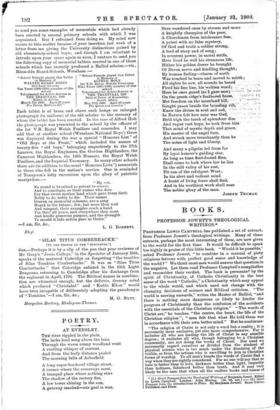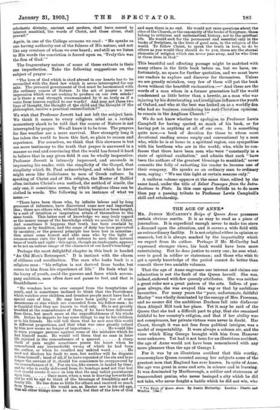BOOKS.
PROFESSOR JOWETT'S THEOLOGICAL WRITINGS.* PROFESSOR LEWIS CAMPBELL has published a set of extract.'
from Professor Jowett's theological writings. Many of these extracts, perhaps the most interesting of them, are now given to the world for the first time. It would be difficult to speak too highly in praise of this little book. "Would it be possible," asked Professor Jowett, "to combine in a manual of piety religious fervour with perfect good sense and knowledge of the world ? " We think most men would answer that question in the negative. Let them read Professor Campbell's compilatlon and reconsider their verdict. The book is permeatee by the spirit of Christianity, of Catholic Christianity in the best sense of the word "Catholic," a Christianity which may appeal to the whole world, and which need not change with the changing decisions of science and Biblical criticism. "The world is moving onwards," writes the Master of Balliol, "and there is nothing more dangerous or likely to hinder the progress of Christianity than the confusion of the accidents with the essentials of the Christian religion." "The words of Christ are," he teaches, "the centre, the heart, the life of the Christian religion"; "men felt that what He told them was in accordance with their own better mind." But he continues:
"The religion of Christ is not only a word but a reality; it is necessarily more exclusive, yet also 'snore comprehensive. For it includes all who are leading the life of Christ in any sensible degree ; it excludes all who, though belonging to a Christian community, are not doing the works of Christ. Nor need we necessarily regard ourselves as divided from the student of physical science who is too much under the dominion of the visible, or from the artisan who is unwilling to join in Christian forms of worship. To all men's hearts the words of Christ find a way when they are rightly considered. For no one will say that to hate is better than to love, darkness better than light, impurity than holiness, falsehood better than truth. And it may very likely be the ease that when all the endless books and tomes of • (1.) Select Passages from the Theological Writings of Benjamin Jowett. Edited by Lewis Campbell. London: John Murray. [2s. 6d. net.] — (2.) Select Passages from the Introductions to Plato. By Benjamin Jowett. Same Editor, Publisher, and Price.
scholastic divinity, ancient and modern, shall have ceased to interest mankind, the words of Christ, and these alone, shall prevail."
Again, in one of the College sermons we read : "He speaks as one having authority out of the fulness of His nature, and not like any creature of whom we ever heard; and still as we listen to His words the conviction is forced upon us, Truly this was the Son of God: " The fragmentary nature of some of these extracts is their one imperfection. Take the following suggestions on the subject of prayer :—
"The love of God which is shed abroad in our hearts has to be reconciled with the fixed law which is never interrupted for our sake. The personal government of God must be harmonised with the ordinary course of Nature. Is the act of prayer a mere impression which we are seeking to produce on our own minds ? or is there a real strength communicated: by it .as.truly aa if- a voice from -heaven replied to our Words?. AinLiney-not.the two lines of thonght, the thought of the child ands thh.ought o the philosopher, receive a practical We wish that Professor Jowett had not left the subjeetheie. We think it comes to every religious mind as a ..-certain
momentary shock to be told that the con* of Nature in not interrupted by prayer. We all know it to be true. The prayers for fine weather are a mere survivaL How strangely. long it has taken the world to learn this fact, so plain to reason and experience. For ourselves, we think that this slowness is but one more testimony to the truth that Prayer is answered in a manner so real and convincing that the world has found it hard to believe that in any given field it can be wholly inoperative. Professor Jowett is intensely impressed, and succeeds in impressing his reader, with the simplicity of the Gospel, that simplicity which St. Paul acknowledged, and which he .knew might seem like foolishness to men. of Greek culture. In speaking of Christ and of His religion, the Maiiter of Balliol often imitates Christ s own method, the method:of simile, the only one, it sometimes seems, by which religions ideas can be clothed in words. The following is an instance of What we
MAR r,•7-
"There have been those who, by infinite labour and by long processes of inference, have discovered some new and important idea; there are others who, without having learned or been taught, by a sort of intuition or inspiration attain of themselves to the same truth. This latter sort of knowledge we may truly regard as the nearer image of the knowledge which we ascribe to Christ. And sometimes it happens that truth has been overlaid by opinion or by tradition, and the sense of duty has been perverted by casuistry, or the general principle has been lost in minutiae: them arises some honest and able man who by the light of common-sense cuts the knot and restores to men their natural tense of truth and right : this again, though an inadequate, appears so be not an untrue image of the character of our Lord's teaching."
Perhaps the most delightful chapter in this book is headed "An Old Man's Retrospect." It is instinct with the charm of stillness and recollection. The man who looks back is a religious man : "his religion is not derived from books, but comes to him from his experience of life." He feels what in the hurry of youth, amid the guesses and fears which accom- pany ambition, men often dare not pause to feel, and that is thankfulness :—
" He wonders how he ever escaped from the temptations of youth, and is sometimes inclined to think that the Providence which watches over children and drunken people must have had a special care of him. He may have been guilty too of some meaianesses or sins which are concealed from his fellow-men ; he is thankful that they are known to God only. He is not greatly troubled at the remembrance of them, if he have been delivered from them, but much more at the unprofitableness of his whole life. Before he departs he has some things to say to his children or to his friends. He will tell them that he now sees this world in different proportions, and that what was once greatly valued
by him now seems no longer of importance He would like to warn younger persons against some of the mistakes which he had himself made. He would tell them that no man in later life rejoiced in the remembrance of a quarrel. . . . . . A sharp thrill of pain might sometimes pierce his heart when he remembered any irremediable wrong of which he had been the author, or when he recalled any unkind word He need not disclose his fault to men, but neither will he disguise it from himself; least of all, if he have repented of the sin and is no longer the servant of it, should his conscience be overpowered by the remembrance of it. For sin too, like sorrow, is healed by time; Slid he who is really delivered from its bondage need not fear lest God should create it anew in him that He may inflict punishment Upon him Once more, when a man is drawing towards the end he will be apt to think of the blessings of friendship and of family life. He has done so little for others and received so much from them. He would see, as Baxter saw in his old age, and man therein no end. He would not raise questions about the rites of the Church, or the canonicity of the books of Scripture: these belong to criticism and ecclesiastical history, not to the spiritual life. He would seek for the permanent and essential only in the books of Scripture, in the lives of good men, in the religion of the world. To follow Christ, to speak the truth in love, to do to others as you would they should do to you, these are the eternal elements of religion which can never pass away, and he who lives in these lives in God."
This beautiful and affecting passage might be matched with many others in the little book before us, but we have, un- fortunately, no space for further quotation, and we must leave our readers to explore and discover for themselves. Unless we are greatly mistaken, very few of them will put the book down without the heartfelt exclamation:—" And these are the words of a man whom in a former generation half the world condemned as little better than a heretic, as a man who was injuring by his deteriorating andirreligiiiiis influence the youth
of Oxford, and Who at the best was booked worldly doti
who had no bnainess, considering Ins antiChriatian opinions,
to remain in the AttgliCan. Church ! " : We do not know whether to apologise. to professor Lewis Campbell for having quoted.. much of his 'book,. or for having put in anything at all of (air own. It is something quite new,—a book of devotion for those to whom most devotional reading seems empty and conventional by a man who, while he is at home in a spiritual region, can sympathise with his brethren- who are in the world; who, while he con- fesses that there have been men who were !` constantly in a state of spiritual exaltation," and admits that such "have been the authors of the greatest. blessings to manki d," never commits the folly of exhorting his reader to :become one -of their company. He speaks as an ordinary man to ordinary men, saying: "We see this light at. certain seasons only." A uniform volume appears at the mime. time, edited by the same hand, under the title of Select Passages from the Intro- ductions to Plato. In this ease space forbids us to do more than pay a passing tribute to Professor Lewis Campbell's skill and scholarship.























































 Previous page
Previous page